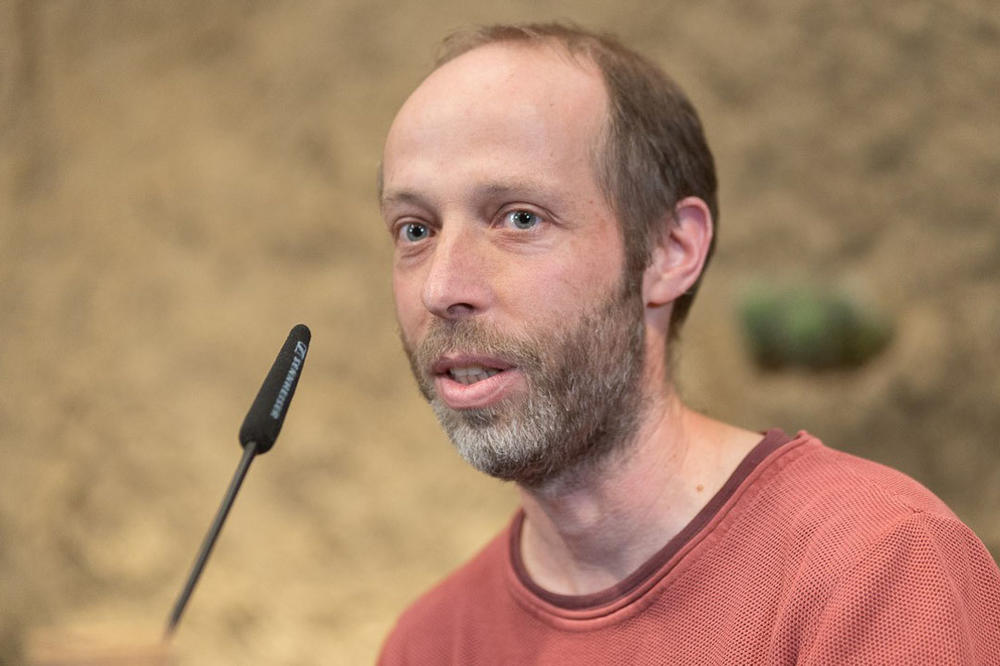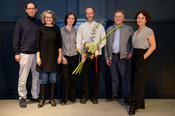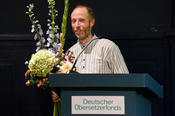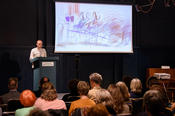“A translation is a new creation, not a copy”
Interview with translator Thomas Weiler – Inaugural lecture as the August Wilhem von Schlegel Visiting Professor of Freie Universität Berlin on October 31, 2024
Nov 14, 2024
Translator Thomas Weiler is the August Wilhelm von Schlegel Visiting Professor at the Peter Szondi Institute of Freie Universität Berlin for this winter semester.
Image Credit: Sergei Balai
Since 2007, Thomas Weiler has translated a wide variety of works, including literature, poetry, and children’s books, from Belarusian, Russian, and Polish. In this interview he speaks about translation as its own creative process and the human rights situation in Belarus.
Mr. Weiler, you are critical of the common view that translations are a “losing venture.” Why is that?
Most reviews of translated novels in the major German newspapers are based on the presumption that the original version is flawless, almost sacred even. Seen this way, a translation can only ever fall short of the original, no matter how good it may be. This view is skewed toward what is missing, and measures the quality of a translation, to a certain extent, by how well it is able to mitigate the unavoidable losses.
This is a questionable understanding of translation. A translation is a new creation, not a copy of the original work. The translator must try to create the world that the author creates in the original language in the target language, with all of its aspects and moods.
Image gallery: Thomas Weiler's inaguaral lecture as August Wilhelm von Schlegel Visiting Professor explored translations as creating spaces for dialogue, even when that space might be a dead end.In the seminar that you are offering as visiting professor, you intend to explore various approaches to translation with the students. Can you give us some examples?
There is the standard question of the extent to which translators should bring their own personality into the translation. Some people think translators should see themselves as servants who take themselves out of the picture and strive only to reproduce the voice of the author.
Other translators argue that one should always maintain one’s own style. These are usually the ones who are authors in their own right. In the translations of poetry by the poets Ernst Jandl and Paul Celan, their own voices are clearly recognizable.
Where do you situate your own work?
That is not an easy question! I am most certainly a translator and not an author myself. The diversity of voices interests me. A new world opens for me with each new author and each new novel. I am curious about the tones and moods that reverberate in its pages. I am also interested in the question: How could these tones and moods be expressed in German? My own life and reading experiences naturally also play into my translation.
The novel you translated, Europas Hunde by Alhierd Bacharevič was declared a work of extremist literature and banned in Belarus in 2022. The author had to leave his home country. How do you feel about the mood in the country under the authoritarian rule of Aleksandr Lukashenko?
I have had close ties to Belarus since I finished school; after high school I lived in Minsk for a year and a half. Through my work I am in close contact with many authors and publishers.
In 2020, I experienced how the protest against election fraud was initially tied to great hopes for a new beginning – and then brutally smothered. Since then, the situation has become even worse. Before, there were no such book bans. This book was removed from all libraries, and anyone who possesses it is now subject to prosecution.
The vast majority of critical voices working in the cultural sector, like the author Alhierd Bacharevič for example, had to go into exile. Great danger awaits those who stay. Just recently, a translator whom I know well was sentenced to three years in prison. He had made a donation to the Ukrainian military, and in Belarus this is treated as support for terrorism.
Through the war in Ukraine, Eastern Europe has attracted more public attention in Germany than ever before. Do you feel that the view of the region in the eyes of the German public is undergoing a transformation?
I cannot speak for the public in general. But in the cultural scene and in academia I am indeed seeing changes. Many institutes of Slavic studies have become recently aware that for decades their focus had been too one-sided, namely they concentrated too much on Russia. There had always been the image of a “post-Soviet cultural sphere.” Now they are beginning to look closer. We are rediscovering the diversity of Slavic languages and of the worlds that are opened by, for example, Belarusian literature.
Dennis Yücel conducted the interview.
The original German version of this article appeared in campus.leben, the online magazine published by Freie Universität Berlin.
Further Information
More information on the August Wilhelm von Schlegel Visiting Professorship for Translation is available at https://www.geisteswissenschaften.fu-berlin.de/en/we03/institut/gastprofessuren/august_schlegel/index.html.




